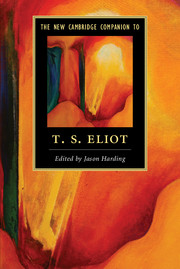Book contents
- Frontmatter
- Contents
- Notes on contributors
- Preface
- Chronology of Eliot's life and works
- List of abbreviations
- 1 Unravelling Eliot
- 2 Eliot: Form and Allusion
- 3 Prufrock and Other Observations
- 4 Banishing the Backward Devils: Eliot's Quatrain Poems and “Gerontion”
- 5 With Automatic Hand: The Waste Land
- 6 “Let These Words Answer”: Ash-Wednesday and the Ariel Poems
- 7 Four Quartets
- 8 “A Precise Way of Thinking and Feeling”: Eliot and Verse Drama 116
- 9 T. S. Eliot as Literary Critic
- 10 T. S. Eliot's Social Criticism
- 11 Gender and Sexuality
- 12 Eliot's Philosophical Studies: Bergson, Frazer, Bradley
- 13 “Anglo-Catholic in Religion”: T. S. Eliot and Christianity
- Select bibliography
- Index
- Miscellaneous Endmatter
8 - “A Precise Way of Thinking and Feeling”: Eliot and Verse Drama 116
Published online by Cambridge University Press: 01 December 2016
- Frontmatter
- Contents
- Notes on contributors
- Preface
- Chronology of Eliot's life and works
- List of abbreviations
- 1 Unravelling Eliot
- 2 Eliot: Form and Allusion
- 3 Prufrock and Other Observations
- 4 Banishing the Backward Devils: Eliot's Quatrain Poems and “Gerontion”
- 5 With Automatic Hand: The Waste Land
- 6 “Let These Words Answer”: Ash-Wednesday and the Ariel Poems
- 7 Four Quartets
- 8 “A Precise Way of Thinking and Feeling”: Eliot and Verse Drama 116
- 9 T. S. Eliot as Literary Critic
- 10 T. S. Eliot's Social Criticism
- 11 Gender and Sexuality
- 12 Eliot's Philosophical Studies: Bergson, Frazer, Bradley
- 13 “Anglo-Catholic in Religion”: T. S. Eliot and Christianity
- Select bibliography
- Index
- Miscellaneous Endmatter
Summary
Though his fame rests upon his poetry, T. S. Eliot spent a significant portion of his career writing about drama and composing plays. Before he was the author of The Waste Land or the editor of the Criterion, before he converted to Anglicanism or won the Nobel Prize for literature, Eliot was a critic and theorist of the stage, profoundly concerned with the state of contemporary theatre and determined to change its direction. His productions eventually drew the best actors from Hollywood and London and won him great commercial success. This chapter seeks to emphasize Eliot's lifelong commitment to the theatre and especially to plays composed in verse rather than in prose. He regarded drama as a genre of poetry, like lyric or epic, rather than as a distinct form. And he believed, like many of his contemporaries, that naturalistic prose plays had severely limited its range and expressiveness. “The prose play,” he frequently insists, offers “only a part of what the theatre can give,” adding that “the verse play is capable of something much more intense and exciting.”
Eliot found examples of that intensity and excitement in ancient Greek and Renaissance English sources: Aeschylus and Sophocles, Marlowe and Jonson. But the form also flourished in the nineteenth century, as he recognized: “Nearly all the greater poets of the last century,” he admits, “tried their hands at verse plays” (OPP 27). Though frequently critical toward them in his essays, Eliot was influenced by the verse plays of Byron, Shelley, Browning, and Tennyson. He was drawn to the tragedies of Swinburne, especially Atalanta in Calydon (1865); and he admired Rostand's Cyrano de Bergerac (1897) and Hardy's The Dynasts (1904–8). Of course he found a stalwart ally in W. B. Yeats, whose ritualistic, abstract play At the Hawk's Well (1916) he attended when it opened. And he promoted the theatrical experiments of W. H. Auden, whose Paid on Both Sides: A Charade (1930) first appeared in the Criterion and whose collaborations with Christopher Isherwood were indebted to Eliot's own work, especially to the many essays and reviews in which he had begun to elaborate his theories of dramaturgy.
- Type
- Chapter
- Information
- The New Cambridge Companion to T. S. Eliot , pp. 116 - 130Publisher: Cambridge University PressPrint publication year: 2016

